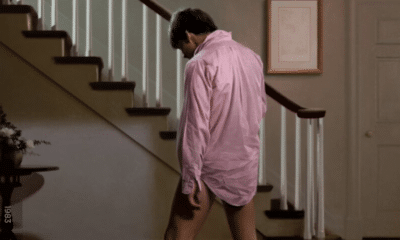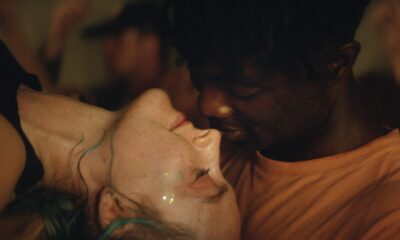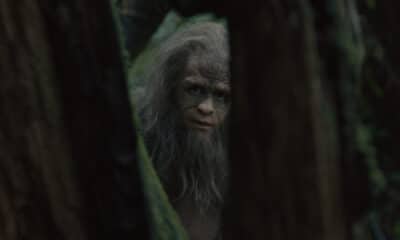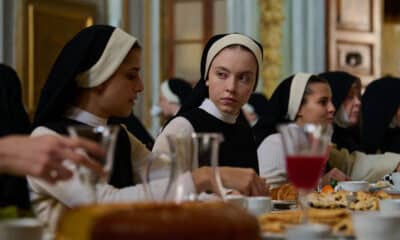
Ahead of Friday’s release, THN were lucky enough to be invited to a rather intimate press conference for JACK RYAN: SHADOW RECRUIT. In attendance were producers David Barron, and Lorenzo Di Bonaventura, director Kenneth Branagh, and stars Keira Knightley, and Chris Pine.
All spoke very highly of each other and their experience, Knightley was every bit the English rose that she’s portrayed as, Sir Kenneth Branagh is exceptionally chatty and well spoken, and Chris Pine is one handsome specimen of a man.
Here’s how the conference went down:
David and Lorenzo, you said that you felt Chris and Ken had breathed new life into this character, I wondered what it was that had you all in for with this new incarnation of Tom Clancy’s most famous character?
DI BONAVENTURA: The opportunity that we had, doing an origin story, was something that hadn’t been done before. You were able to see a more complete character study of somebody. You rarely see a movie where you see the lead character probably facing the 3 or 4 most seminal moments of his life all in one movie. You usually have one seminal moment if that, so that was a great opportunity to connect the audience to the character again.
BARRON: I agree with Lorenzo, but being an origin story meant that we could introduce a new audience to an old character, a character that previous generations had lived with but they themselves had not necessarily. It was very useful starting from the beginning.
What was it about the script that marked this one out as special?
KNIGHTLEY: I’d never done a thriller before, I don’t think, and it’s always a genre I’ve really liked. I think it’s a very difficult one because you combine action with proper story-telling. It needs a proper storyteller to do it, so I was quite excited by the challenge of it.
BRANAGH: I just couldn’t put the script down, as simple as that really. David Koepp’s screenplay came along; I knew Chris was involved and that was exciting, I thought that was a great piece of casting. I did know the previous films and some of the novels, and like Keira, I love thrillers. It was a chance to try and do what the boys were saying, put Jack Ryan and the things that make him compelling for an audience (that character as created by Clancy) into the twenty-first century and see if he and that new world collided in a strong and entertaining way.
PINE: I was curious about playing a guy, who I felt whose experience really pivoted on 9/11; a man who went and served in a war, and was affected by war, damaged physically and psychically, and emotionally, but was still compelled to serve, had to serve. He felt very contemporary, he just felt very ‘of the now’, and I liked the idea of that kind of reluctant hero, being compelled to serve from something deep within himself, a deep sense of a personal moral code.
Having been to Moscow in the summer, and having recognised places, I was surprised to see it wasn’t credited as a location. How did you go about transforming London and Liverpool to look so realistic to the Moscow streets?
BRANAGH: Well we did go to Moscow actually, I won’t tell you how many days, but we were there briefly, and one of the things we did do was try and (because it was early in the shoot) establish the breathless pace the film often has. So I remember we got off the plane from New York that morning, went to recee the first place in Moscow.
Then that afternoon, Chris was up on a hotel roof with us saying ‘we’ve got forty min, the sun is going, there’s a three page dialogue scene. Would you mind doing it in one go? We’ve got thirty minutes.’
Moving around Moscow was a lot like that, so when we came back to some of the cheated Moscow – Liverpool, Manchester, parts of London, we adopted the same hit-the-ground-running approach. But we were there long enough, at least I thought, to get a sense of the vibrancy that the new Moscow has.
Keira it’s been a long time since you did a franchise film, what was it that tempted you back?
KNIGHTLEY: I think when I had finished Anna Karenina, I realized that I have been playing characters that died, or something horrendous happened to them, for the last five years and I fancied doing something fun. So I think it was partly to do with that. I really enjoyed the script, I couldn’t put it down, it was a page-turner and then there was Ken. Ken basically said ‘Ah go on, do it,’ and I went ‘oh alright then.’ So it was a combination of all those things.
Cathy’s more than a damsel in distress, was that important to you in terms of taking this role?
KNIGHTLEY: Yes, absolutely. As far as the relationship between Cathy and Jack goes I was interested in the idea of what happens to a relationship when there’s a secret; when there is something that can’t be discussed, something that can tear two people apart even though they are completely in love. I was interested in what that did to the relationship, I thought that was a very interesting part of the story, what people who work in secret services have to give up, and the kind of emotional toll it takes on them. I thought that was very interesting.
Ken all those years ago when you started out directing, did you ever think you’d have this kind of directing career? Was it ever an aspiration for you to do the big hollywoody type movies that you are doing now?
BRANAGH: Frankly it was astonishing to think of having a film career of any sort when I started out. Before Henry V we had a very long dull period in the British film industry where British films weren’t being made. I remember a conversation with fellow actors wondering if we would ever be in a film, so that’s already a surprise. Yeah it’s astonishing really, except that I like to see pictures like this, they’re hard to make, they appear simple, you hope they work actually, and that they appear simple, and yet they’re very interesting to try to put together. But in terms of a moment where you wonder why and how you’re doing it, which is bypassed as you’re essentially trying to follow your instincts as best you can. So for me the moment when you read the script is the key one. I try to make that a special moment with plenty of time aside and see what it does to you, if it really grabs you. Then you know that you have a chance that over the two-year cycle that it might be, probably because I’d be directing, it needs to stimulate you. I was very lucky to work with producers and great actors, people who are going to be fun to work with. In the end that becomes your experience. So its actually only moments like this when you step out and even have a sense of your objective part in it. You’re trying to do work that you believe in and so I kept trying to follow that regardless of scale.
Is there any book that you would like to see made that hasn’t been?
DI BONAVENTURA: We looked at this thing as an opportunity to mine from all the different books. I honestly haven’t thought about what book in particular, and now having done this with Chris, we are at a younger phase than most of the books are at. So I kind of think we have trapped ourselves into not being part of the books at the moment. But what we’ve been able to do is be really true to the books by taking all of these pieces of information and putting them into one movie, which no other movie was able to do, because they were constrained with the story.
PINE: I just think the world that we live in now is fertile ground enough to mine many interesting stories, given what we know about tapping phones and all sorts of other stuff like that.
BRANAGH: In terms of Jack Ryan books, I’m happy that we’re out in the real world and not using specific ones.
Ken, how was it dealing with the duality of roles, both directing and starring in it?
BRANAGH: Well way back when I started the first one, we didn’t have monitors, we made the whole Henry V without any kind of monitors. Your judgment of performance was based on conversations with your fellow actors and the camera operator, and then you had to guess twenty-four/forty-eight hours later, when you saw the dailies about, whether you were right about that. Which I do think allows you to tap into a certain kind of instinct, but we did a number of things. I mean from my point of view you just prepare and try and be ahead of the game with the accent and everything. Then we arrived at a kind of census on how we might do things, which put us all on the same page. Both Chris, from the get go, and Keira when she came in as well, were very good at it.
(To Keira & Chris) if you recall we ended up shooting quite soon each day, we often started shooting with close-ups, we didn’t rehearse much; we just talked quite a bit. We got straight in, so the idea was that we sort of played with each other. For instance the scene at the dinner table, was a number of different scenes, but I remember saying to you some days ahead ‘would you mind doing this as an entire scene, which will be many pages of dialogue, but we’ll run it as one’, and to sort of make that case, we often improvised the bit between the divisions of the scenes.
That’s the kind of thing Chris was doing as a matter of course from the word go, there was a sort of sense of play about that. So other than the accent, the one thing I wanted with this movie was, I wanted to feel the character work and the reality of the acting all had that sort of edge underneath it, which is part of Jack’s journey, part of the rhythm of the film and part of that little naturalistic edge that I enjoy doing with my fellow actors. In going for that, I think that was a goal for the atmosphere of the scene rather than me having to hit acting x, y or z, but I prepped for that, but I wanted it all to feel as relatively raw as possible so we weren’t too slick or smooth. I had a great time acting with these people.
Chris, Jack Ryan is the big franchise character that no actor wants to commit to for more than a couple of films in the past, do you have a theory on why that’s been, and do you think that now is the time for him to compete with Bond and Bourne?
PINE: Well I like the fact that he seems more real and grounded than the other action heroes. There’s no Q, and there’s no fancy gadgets, and he’s not a man of fancy suits, or Russian supermodels. We have the lovely Keira Knightley, he’s monogamous, simple, for all of his complexity and intelligent, and I fought this for a long time with Ken. I always wanted him to have some kind of crutch, something to make him brooding and angstful, but really he’s a simple guy that wants to serve, and feels compelled to serve. I think in that simplicity, kind of everyman quality, he could be your professor, he could be the guy you get coffee next to, and not think twice seeing him in the street. There’s something about that normalcy that I think sets him apart from all these guys that are trained assassins and drive fast fancy cars, and hopefully that relate-ability for the audience will be the thing that encourages them to come back for more. In particular the fight scene that my character has with Nonso Anozie, above all what I think is a fun, attractive stunt, is the moment afterwards where the lead character has to deal with taking a life. Ken and I talked about that; we’d never really seen that in an action movie this size. I think moments like that, moments of a moral Jack, of a moral human being, of a man that feels, that isn’t closed off, are important. Whilst I’m talking I’m reminded of another talking scene when I tell Costner ‘I just killed someone’ and he just throws me a gun and says ‘you’re operational now’, and then walks off. You see the effects of living in that world for so long, and then the young man that’s just getting into it and still feels, I think, especially with having an anchor like Keira in Cathy, that warms Jack, that reminds Jack to feel, will set him apart from other heroes in this genre.
How easy is it logistically to film in a place like Russia, when the content of the film, with them being the villain, might not show them in the best light?
BARRON: It actually wasn’t that hard, we didn’t have to make a representation to the Kremlin. We worked with a team of young Russian fixers, and quite who they were associated with we never really knew, but they seemed to fix things really, really well. They made life and filming really quite easy. We were only there for a few days, had it been a few weeks I’m not sure they would have understood the pace, as Ken said, we hit the ground running. They just made it happen.
BRANAGH: I think that people understand though that this was a drama, and that in a way, without copping out, but being quite specific our intention, was to tell the story of one fictional Russian Oligarch, with a very specific personal biography and history that was not trying to (at a stroke) try to say here is what all wealthy Russians are like. I think people understand, and more so in theatre I’ve been doing Macbeth, the Scots are up in arms about being portrayed as murderers and regicides, one has to take it in the context of that. In a sense for us what was fairly interesting in the Clancy DNA was that, these books are set in the cold war period, featuring this old enemy, this rivalry between Russia and America. It’s very clearly there right now and in the person of this unusual modern creation, the Oligarch, they’re wealthy, sometimes you don’t know what they own, what the state owns, they’re blurrily linked to the government, so they’re formidable individuals. So the possibility of looking at that as a possibility of a representation of a legitimate investigation, is in the tradition of such things. Russians are great storytellers, we don’t paint the Americans out to be whiter than white and I hope they respected that. We managed to leave it in one piece, and in fact the movie, right now, is number one in Russia. Thankfully.
DI BONAVENTURA: A hero is measured by his foe. As Ken was saying, he is a fictional character, but when you think about the Oligarch’s, they have just such an enormous amount of wealth, and a sense of entitlement that makes it a worthy foe.
Chris, how much of the stunts were you?
PINE: I tried to do most of my own stunts and had a great time doing them. We had a great stunt team behind us. We had a great 2nd unit directed by Vic Armstrong, who’s been around, and is a master of the craft. But I tried to do the most that I could.
To women of a certain age, Kevin Costner is seen as somewhat of a sex symbol. What was it like working with him?
PINE: Kevin Costner is sexy. That’s for damn sure. When we were doing press in LA he rolled up in cowboy boots, a vest and sunglasses, and you just knew that this man was an American movie star.
DI BONAVENTURA: One of the most interesting things about Kevin is as a person, and as an actor, he commits so utterly and completely to his point of view. I think it’s one of the things that endears him to us, that he is a guy who wears it right on his sleeve. In this case, having Kevin in this movie was fantastic for us as it was not the traditional younger/older man relationship, because he’s not sat behind a desk. So you needed a guy like Kevin who can go out into the field and shoot somebody and be active. But that the audience believes that he’s capable of it was a great advantage.
BRANAGH: I think for me it was like coming full circle. When I first went to Hollywood, I was in two plays, I was on tour with two Shakespeare plays and I got a call at the theatre one day saying ‘there’s a man called Kevin Costner who would like to take you out for lunch,’ and this was at the beginning of 1990. I went out and he wanted to ask me about what it was like to act and direct in a movie at the same time, because I’d just completed doing Henry V and he was going to do it for film called Dances With Wolves. We had a long boozy lunch, sharing war stories about the madness and fun of all of that, and that was the beginning of a friendship that has lasted across all that time. In fact he was very, very helpful about the same process in this, twenty-five years later. Having him there was very nice, it felt like the conversation was ongoing and a generous act (buying him lunch) in the first place and generous of him to be in the picture.
KNIGHTLEY: Absolutely lovely. Very sexy. I only did one scene with him, I wish I’d done more. He was an absolute delight.
BARRON: Even I found him sexy and I can’t say more than that.
And on that note the conference was over.
JACK RYAN: SHADOW RECRUIT is released in the UK on Friday 24th Janurary, see our review here.
Kat Hughes is a UK born film critic and interviewer who has a passion for horror films. An editor for THN, Kat is also a Rotten Tomatoes Approved Critic. She has bylines with Ghouls Magazine, Arrow Video, Film Stories, Certified Forgotten and FILMHOUNDS and has had essays published in home entertainment releases by Vinegar Syndrome and Second Sight. When not writing about horror, Kat hosts micro podcast Movies with Mummy along with her five-year-old daughter.

Latest Posts
-


Home Entertainment
/ 2 hours ago‘Risky Business’ and ‘Blow Out’ are getting the UK Criterion treatment
Risky Business and Blow Out will be released on UK Criterion 4K Blu-ray this...
By Paul Heath -


Film News
/ 2 hours agoRelease date announced for ‘The Outrun’ with Saoirse Ronan
After premiering at this year’s Sundance and the Berlinale in Germany, the UK release...
By Paul Heath -


Apple TV
/ 1 day agoTrailer: André Holland leads Apple’s new limited series, ‘The Big Cigar’
Apple TV+ has released the full trailer for The Big Cigar, a new, six-episode...
By Paul Heath -


Film News
/ 1 day agoUK trailer, poster and release date for Sundance smash ‘Sasquatch Sunset’
Premiering in the UK at the Sundance London event in June is the brilliant...
By Paul Heath















